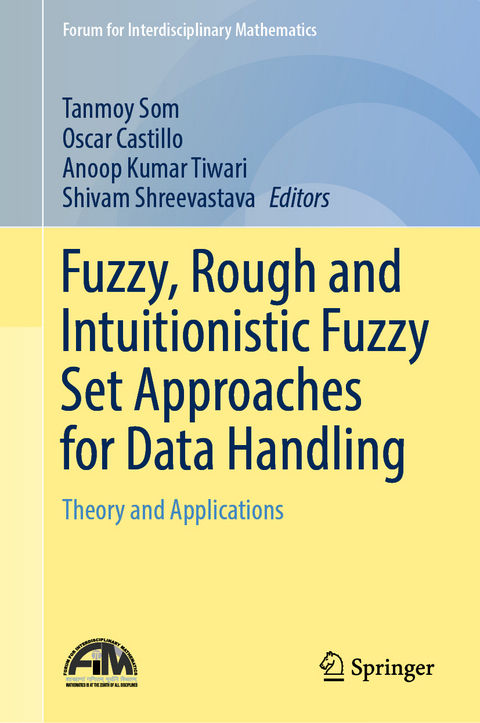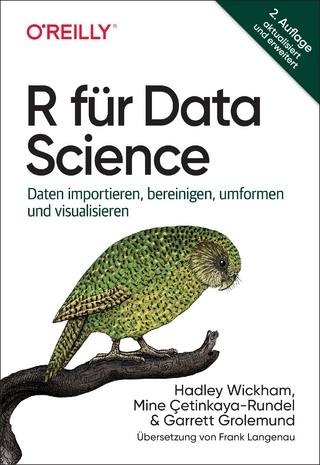
Fuzzy, Rough and Intuitionistic Fuzzy Set Approaches for Data Handling
Springer Verlag, Singapore
978-981-19-8565-2 (ISBN)
Tanmoy Som is Professor and former Head at the Department of Mathematical Sciences, Indian Institute of Technology (Banaras Hindu University), Varanasi, India. He completed his PhD from Institute of Technology, Banaras Hindu University, India, in 1986. Earlier, he had been the Head of the Department of Mathematics (twice) at Assam Central University, Silchar, India. His research interests are in functional analysis, optimization and mathematical modelling, fuzzy set theory, soft computing and image processing. He has successfully guided 18 PhD students and published more than 100 papers and several book chapters in reputed international journals, proceedings and edited books. He has published several papers on metric fixed point theory, optimization modelling and recently on applied analysis, soft computing and fuzzy geometry. He has completed a BRNS-BARC funded project titled “Fractional calculus approached solutions for two dimensional ground water contaminations in unsaturated media” during 2014-18 jointly with Professor S. Das of the Indian Institute of Technology (IIT-BHU) Varanasi. A Guest/Handling Editor of International Journal of Fuzzy Computation and Modelling since 2018, Prof. Som is an editorial board member and reviewer of several reputed journals including IEEE Transactions, American Mathematical Society. He has jointly edited along with D. Ghosh, D. Giri, Ram N. Mohapatra, K. Sakurai and E. Savas the proceedings, Mathematics and Computing: ICMC 2018, Varanasi, India, January 9–11, Selected Contributions. He has delivered several invited talks at national and international conferences, seminars, and refresher courses and has organized three international events as the main convener. He holds the Vice-President position of Calcutta Mathematical Society. He has made short academic visits to Texas A&M University, Kingsville (2012) and the University of California, Berkeley (2016). Oscar Castillo is Professor of Computer Science at the Graduate Division, Tijuana Institute of Technology, Tijuana, Mexico. In addition, he is serving as Research Director of Computer Science and Head of the research group on Hybrid Fuzzy Intelligent Systems. Currently, he is President of Hispanic American Fuzzy Systems Association (HAFSA) and Past President of International Fuzzy Systems Association (IFSA). He holds the Doctor of Science degree (Doctor Habilitatus) in Computer Science from the Polish Academy of Sciences (with the dissertation “Soft Computing and Fractal Theory for Intelligent Manufacturing”). Professor Castillo is also Chair of the Mexican Chapter of the Computational Intelligence Society (IEEE). He also belongs to the Technical Committee on Fuzzy Systems of IEEE and to the Task Force on “Extensions to Type-1 Fuzzy Systems”. He is Member of NAFIPS, IFSA and IEEE. He belongs to the Mexican Research System (SNI Level 3). His research interests are in type-2 fuzzy logic, fuzzy control, neuro-fuzzy and genetic fuzzy hybrid approaches. He has published over 300 papers in several journal, authored 10 books, edited 50 books, more than 300 papers in conference proceedings and more than 300 chapters in edited books; in total more than 1000 publications according to Scopus (H index = 66) and more than 1200 publications according to Google Scholar (H index = 80). He has been Guest Editor of several successful special issues of the following journals: Applied Soft Computing, Intelligent Systems, Information Sciences, Nonlinear Studies, Fuzzy Sets and Systems, JAMRIS, and Engineering Letters. He is currently Associate Editor of Information Sciences, Engineering Applications of Artificial Intelligence, Complex and Intelligent Systems, Granular Computing, and International Journal on Fuzzy Systems. Finally, he has been elected IFSA Fellow in 2015 and MICAI Fellow member in 2017. He has been recognized as Highly Cited Researcher in 2017 and 2018 by Clarivate Analytics because of having multiple highly cited papers in the Web of Science. Anoop Kumar Tiwari is Assistant Professor at the School of Computing Science and Engineering, VIT Bhopal University, Kothrikalan, Madhya Pradesh, India. He holds the Ph.D. degree in computer science from the Department of Computer Science, Institute of Science, Banaras Hindu University, India. His research interests are in computational intelligence, machine learning and bioinformatics. He has published more than 18 publications with h index of 5 and more than 131 citations according to Google Scholar. He has qualified reputed UGC-NET and GATE exams. He is also Reviewer of some reputed journals: Journal of Intelligent and Fuzzy Systems, International Journal of Fuzzy System Applications, and Expert Systems with Applications. Shivam Shreevastava is Assistant Professor at the Department of Basic Sciences, Galgotias University, Greater Noida, India. He has completed his B.Sc. from Banaras Hindu University, Varanasi; M.Sc. from the Indian Institute of Technology Kanpur; and Ph.D. from the Indian Institute of Technology (BHU) Varanasi. He has qualified several competitive examinations like JAM, CSIR/UGC JRF, GATE, NBHM MA/M.Sc. fellowship. His main research interest includes soft computing, attribute reduction via fuzzy rough set-based techniques. More than 11 research publications are there to his credit in reputed journals/edited book chapters of national and international repute. He has delivered several invited talks at national and international conferences/workshops/refresher courses. He is also Reviewer of some journals of international repute like International Journal of Fuzzy Systems, Soft Computing, International Journal of Fuzzy System, and The International Journal of Fuzzy System Applications.
Fuzzy Sets and Rough Sets: A Mathematical Narrative.- Enhancing the Prediction of Anti-cancer Peptides by Suitable Feature Extraction and FRFS with ACO Search Followed by Resampling.- New Methods of Vagueness and Uncertainty Quantification in Lattice Boltzmann Method based Solute Transport Model.- Fuzzy Rough Set-based Feature Selection for Text Categorization.- An Extensive Survey on Detection of Malaria Parasites in Patients based on Fuzzy Approaches.- Application of Feature Extraction and Feature Selection followed by SMOTE to Improve the Prediction of DNA Binding Proteins.- Perspectives of Soft Computing in Multiscale Fluid Flow Systems.- Various Generalizations of Fuzzy Sets in the Context of Soft Computing and Decision Making.- A Linear Diophantine Fuzzy Soft Set based Decision Making Approach using Revised Max-Min Average Composition Method.- Recent Developments in Fuzzy Dynamic Data Envelopment Analysis and Its Applications.- Role of Centrality Measures in Link Prediction on Fuzzy Social Networks.- Interval Solutions of Fractional Integro-Differential Equations by using Modifed Adomian Decomposition Method.- Generalized Hukuhara Subdifferentiability for Convex Interval-valued Functions and its Applications in Nonsmooth Interval Optimization.- Rules Based Classifier for Identifying Fake Reviews in E-Commerce: Deep Learning System.
| Erscheinungsdatum | 29.03.2023 |
|---|---|
| Reihe/Serie | Forum for Interdisciplinary Mathematics |
| Zusatzinfo | 45 Illustrations, color; 15 Illustrations, black and white; XIII, 276 p. 60 illus., 45 illus. in color. |
| Verlagsort | Singapore |
| Sprache | englisch |
| Maße | 155 x 235 mm |
| Themenwelt | Informatik ► Datenbanken ► Data Warehouse / Data Mining |
| Informatik ► Theorie / Studium ► Künstliche Intelligenz / Robotik | |
| Medizin / Pharmazie ► Physiotherapie / Ergotherapie ► Orthopädie | |
| Naturwissenschaften ► Biologie ► Genetik / Molekularbiologie | |
| Technik ► Medizintechnik | |
| Schlagworte | Caputo fractional derivatives • centrally measures • Data envelopment analysis • Data handling • Decision Making • Deep learning • Diophantine fuzzy soft set • feature extension • fuzzy rough • Fuzzy Systems • interval optimization • intuitionistic fuzzy • machine learning • multiscale modelling • smote • Social Networks • Soft Computing • text categorization • Uncertainty Principle • Volterra–Fredholm integro-differential equation |
| ISBN-10 | 981-19-8565-0 / 9811985650 |
| ISBN-13 | 978-981-19-8565-2 / 9789811985652 |
| Zustand | Neuware |
| Informationen gemäß Produktsicherheitsverordnung (GPSR) | |
| Haben Sie eine Frage zum Produkt? |
aus dem Bereich


